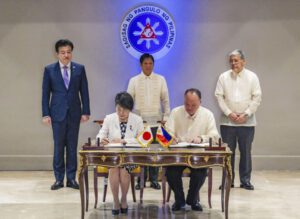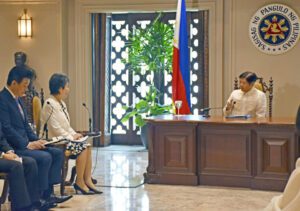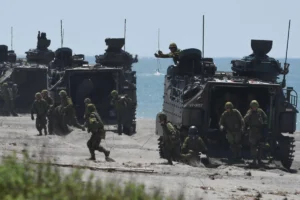Japan and the Philippines have signed a historic defense pact, marking the first such agreement between Japan and an Asian nation. This pact allows troops from both countries to engage in joint military training exercises in the Philippines, highlighting a deepening strategic partnership amid rising tensions in the South China Sea.
Historic Signing Ceremony
-

Philippine President Ferdinand Marcos Jr. (back C) looks on as Japanese Foreign Minister Yoko Kamikawa (front L) and Philippine Defense Secretary Gilberto Teodoro (front R) sign the Reciprocal Access Agreement in Manila on July 8, 2024. (Kyodo) The defense agreement was signed in Manila by Philippine Defense Secretary Gilberto Teodoro and Japanese Foreign Minister Yoko Kamikawa. The signing ceremony, witnessed by Philippine President Ferdinand Marcos Jr., underscores the commitment of both nations to enhancing their military cooperation. This pact aligns closely with President Marcos’ strategy to strengthen security alliances to defend the Philippines’ interests in the contentious South China Sea.

Philippine President Ferdinand Marcos Jr. (R) meets with Japanese Foreign Minister Yoko Kamikawa (2nd from L) and Japanese Defense Minister Minoru Kihara in Manila on July 8, 2024. (Kyodo) Strategic Significance Amid Territorial Disputes
The signing of the Reciprocal Access Agreement (RAA) between Japan and the Philippines holds significant geopolitical weight, especially in the context of escalating territorial disputes with China. Both nations face ongoing challenges from China’s expansive claims over key maritime regions in the South China Sea. This defense pact is a strategic maneuver to counterbalance China’s influence and ensure regional stability.

Japanese soldiers from the Ground Self-Defence Force exit amphibious assault vehicles during a joint landing exercise with Philippine and US troops. Photo: AFP Legislative Next Steps
Before the RAA can be fully operational, it must be ratified by the legislatures of both Japan and the Philippines. This legislative process is a crucial step to formalize the operational framework and solidify the defense commitments outlined in the agreement.
Challenges and Opposition
Despite the strategic importance, the RAA faces several challenges and potential opposition. In the Philippines, there are historical sensitivities stemming from Japan’s past aggression during World War II. These sentiments may fuel domestic opposition to the pact. Furthermore, China is likely to view this strengthened defense alliance as part of a broader U.S.-led strategy to counter its regional influence, potentially leading to diplomatic pushback.
Strengthening Regional Security
This defense pact is a clear indication of the shifting dynamics in Asia’s security landscape. By allowing Japanese forces to train in the Philippines, the two countries are sending a strong message of mutual support and collective defense. This collaboration is expected to enhance the operational readiness and interoperability of their armed forces, contributing to a more robust regional security framework.
Japan and Philippines have Signed a Historic Defense Pact and this marks a new chapter in Asia’s geopolitical narrative. As both nations navigate the complexities of regional security and territorial disputes, this agreement underscores their commitment to peace, stability, and cooperation. The successful ratification and implementation of the RAA will be a significant step towards a more secure and stable Southeast Asia, capable of addressing the multifaceted challenges posed by regional tensions and external threats.
Related news:
Philippines Eyes New Energy Exploration in South China Sea Amid Rising Tensions
China, Japan, and South Korea Pave the Way for Summit to Mend Relations
China and Japan to Resume High-Level Party Talks After Six-Year Pause



















